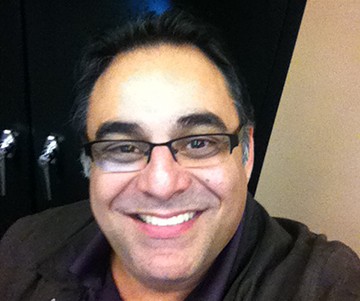Medical Assisting instructor sees himself in his students

Dr. Maziar Aminsalehi does not allow his academic and medical achievements to divide him from his students. He wants them to know that he once sat where many of them now sit; with an unimpressive education and work record, uncertain about a career direction and insecure about their future.
“I got kicked out of two high schools,” says Dr. Aminsalehi. But, he eventually “went from GED to MD.”
“A student’s high school experience has no bearing on what they can become. I want my students to see the potential in themselves that I see.”
He is convinced that his students listen and respond better to someone they know understands their struggles and cares about them. Someone who has put some miles on a very similar road.
“I am a forty-something man up here with an education and title, but I see and know that 17-year-old guy struggling and not knowing what direction to take,” says Dr. Aminsalehi. “I try to give a road map that I lived to show them how to get from here to there.”
It was not until he was 30 years old that Maziar started his medical training. He had finally had enough of those jobs that met some financial needs, but left him feeling unfulfilled.
“It’s really important to find your passion because you have to do something day after day, and it had better be something you love,” says Dr. Aminsalehi.
As a physician, Dr. Aminsalehi could certainly command a higher salary than that of a Medical Assisting program instructor at the Madera campus and, more directly help people with their illnesses. He does not see it quite that way.
“When you are about to take your last breath, you are not thinking about making more money,” he says. “And, if I took care of 20 patients in a day, it is more powerful to me if I helped 35 graduates (Medical Assisting program) go into the health care field.”
His Medical Assisting (MA) students feel the care and investment.
“I have always wanted to be a Registered Nurse; but since I have enrolled in Dr. Mazi’s class, he has made me want to work harder and continue my education to become a Physician Assistant,” says Jacquelyn Goldstein, MA student. “When he gets up in class, he shines.”
It was a career move for Maziar that almost did not happen.
Maziar, his wife Chiquitha and their 10-year-old son had moved in temporarily with Maziar’s parents in Chowchilla, where he helped nurse them both back to health from serious illness. Maziar had suspended his medical training in Las Vegas, just a semester short of completion. After his parents’ recovery, Maziar completed his medical program and moved his family closer to his parents.
One day, while in Madera, Maziar saw SJVC’s signage for the new campus site and felt compelled to walk in and talk with somebody about a teaching position – and he just happened to have a resume in his car.
“I feel the will of God in my life,” explains Maziar, who had submitted many applications for work, had gotten no responses and was trying to get back on his feet. “I was really speaking to the Lord and asking, ‘What do you want me to do?’ I didn’t want a job, I wanted a ministry.”
His question was answered. “I got the most challenging, yet the most exhilarating job of my life.”
Maziar’s days are filled with giving everything he has to his students. “I tell them, be the strength for your patients that they don’t have for themselves. My students have seen me moved, they’ve seen me cry. I tell them that they can’t lose their compassion just because they are the professional.”
“One day when I graduate from medical school, he will be the first person I thank, because he believed in me and he knew I could do it,” says Jacquelyn.
Maziar is often on the receiving end of the student-instructor exchange. “I am challenged,” he says. “They make me grow as a person; make me more adaptable, patient, understanding; it’s reciprocal.”
Maziar is pushing for more. He is studying for his Masters Degree in Theology, which he hopes to complete within the next couple of years.
Hope has been an important element in Maziar’s life, as well as a consistent message to others. “Life is painful without hope,” he says. Maziar clearly lives what he teaches.
You might also like
More stories about
Request Information
All fields using an asterik (*) are required.


